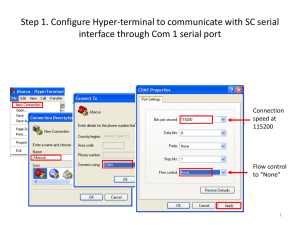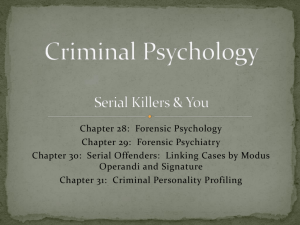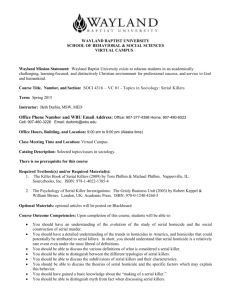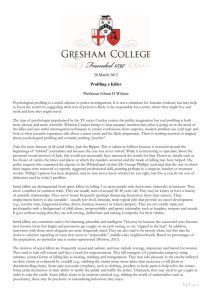PSYC 405: Forensic Psychology
advertisement
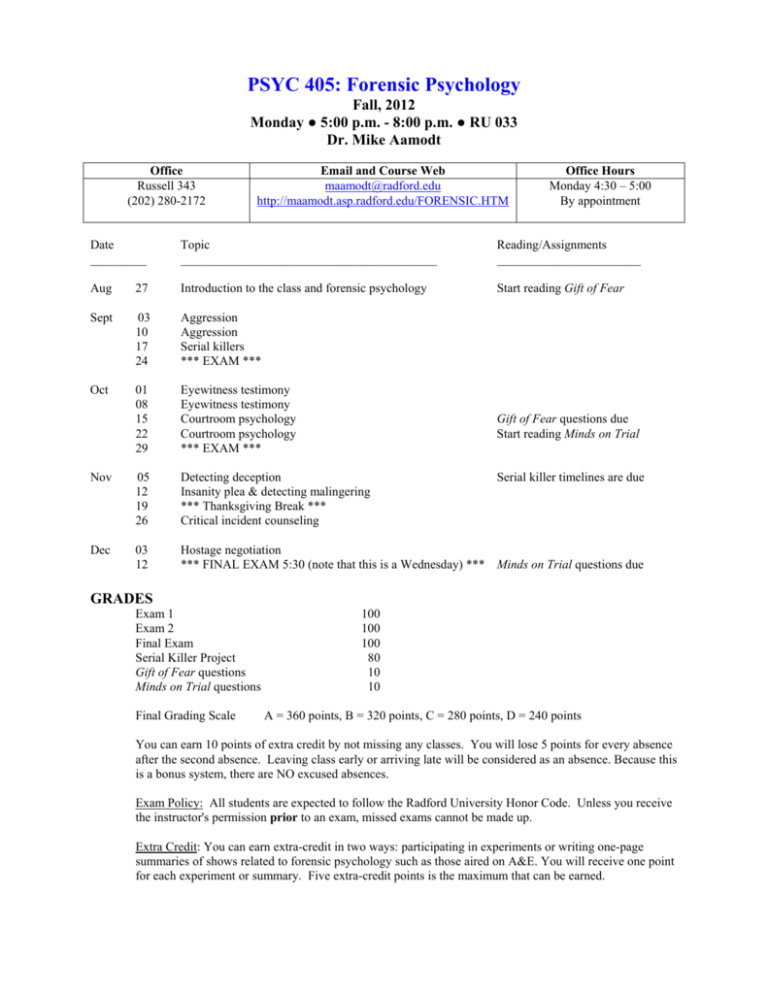
PSYC 405: Forensic Psychology Fall, 2012 Monday ● 5:00 p.m. - 8:00 p.m. ● RU 033 Dr. Mike Aamodt Office Russell 343 (202) 280-2172 Email and Course Web maamodt@radford.edu http://maamodt.asp.radford.edu/FORENSIC.HTM Office Hours Monday 4:30 – 5:00 By appointment Date _________ Topic _________________________________________ Reading/Assignments _______________________ Aug 27 Introduction to the class and forensic psychology Start reading Gift of Fear Sept 03 10 17 24 Aggression Aggression Serial killers *** EXAM *** Oct 01 08 15 22 29 Eyewitness testimony Eyewitness testimony Courtroom psychology Courtroom psychology *** EXAM *** Nov 05 12 19 26 Detecting deception Insanity plea & detecting malingering *** Thanksgiving Break *** Critical incident counseling Dec 03 12 Hostage negotiation *** FINAL EXAM 5:30 (note that this is a Wednesday) *** Minds on Trial questions due Gift of Fear questions due Start reading Minds on Trial Serial killer timelines are due GRADES Exam 1 Exam 2 Final Exam Serial Killer Project Gift of Fear questions Minds on Trial questions Final Grading Scale 100 100 100 80 10 10 A = 360 points, B = 320 points, C = 280 points, D = 240 points You can earn 10 points of extra credit by not missing any classes. You will lose 5 points for every absence after the second absence. Leaving class early or arriving late will be considered as an absence. Because this is a bonus system, there are NO excused absences. Exam Policy: All students are expected to follow the Radford University Honor Code. Unless you receive the instructor's permission prior to an exam, missed exams cannot be made up. Extra Credit: You can earn extra-credit in two ways: participating in experiments or writing one-page summaries of shows related to forensic psychology such as those aired on A&E. You will receive one point for each experiment or summary. Five extra-credit points is the maximum that can be earned. REQUIRED TEXTS De Becker, Gavin (1999). The Gift of Fear. New York: Dell (ISBN-13 978-0-44-050883-0) Ewing, Charles Patrick & McCann, Joseph T. (2006). Minds on trial: Great cases in law and psychology. New York: Oxford University Press (ISBN-13 978-0-19-518176-0) SERIAL KILLER PROJECT Students will work in groups of 3-4 people for this project. If there is a graduate student or an undergraduate student taking this class for honors credit, they will be the leader of the group. I will assign each group the name of a serial killer and the group will research the serial killer to create a timeline and to obtain the information requested on the serial killer template on my webpage. Your grade will be based on the thoroughness and accuracy of your timeline. Sources you can use to obtain information include the Internet, true crime books, other books, and newspaper articles. The newspaper articles may be your best bet for much of the information and you can find these through Lexis-Nexis, Proquest, and by asking the reference librarian for help in finding articles not listed in these sources. All students are expected to attend group meetings, get their research done prior to the deadlines established by the group, and to contribute in any way that helps the group. Group leaders will be asked to identify any student who does not meet these guidelines and such students will receive a lower grade for the project. **************************** Class notes will be sent to you through e-mail and can be obtained at my web site It is essential that you bring these notes to class each evening! CLASS ETIQUETTE It is expected that students behave in a professional manner while in class. You are not permitted to have cell phones or any type of PDA on your desk. They must remain in your pocket/backpack/purse. Should I see you with one, or should your phone ring during class, I will either confiscate it and you can pick it up two days later at the Dean of Students office or I will ask you to leave the class and you will not get credit for attending. Surfing for email or doing other assignments in class is not acceptable. If you are going to bring a computer to class, you must ask permission, sit in the front row of class, and demonstrate that you have the class notes visible. Failure to follow this policy will result in my asking you to leave the class and you will not get credit for attending.



